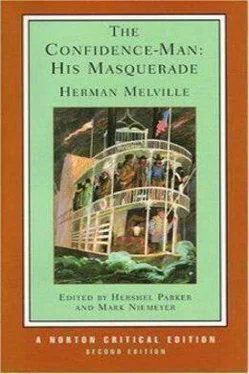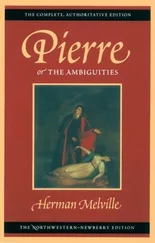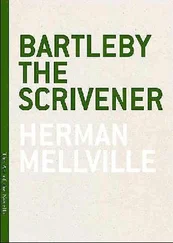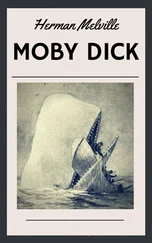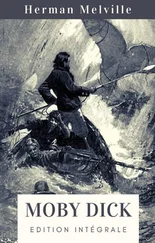"Apocrypha?"
"Yes; and there's the word in black and white," pointing to it. "And what says the word? It says as much as 'not warranted;' for what do college men say of anything of that sort? They say it is apocryphal. The word itself, I've heard from the pulpit, implies something of uncertain credit. So if your disturbance be raised from aught in this apocrypha," again taking up the pages, "in that case, think no more of it, for it's apocrypha."
"What's that about the Apocalypse?" here, a third time, came from the berth.
"He's seeing visions now, ain't he?" said the cosmopolitan, once more looking in the direction of the interruption. "But, sir," resuming, "I cannot tell you how thankful I am for your reminding me about the apocrypha here. For the moment, its being such escaped me. Fact is, when all is bound up together, it's sometimes confusing. The uncanonical part should be bound distinct. And, now that I think of it, how well did those learned doctors who rejected for us this whole book of Sirach. I never read anything so calculated to destroy man's confidence in man. This son of Sirach even says—I saw it but just now: 'Take heed of thy friends;' not, observe, thy seeming friends, thy hypocritical friends, thy false friends, but thy friends , thy real friends—that is to say, not the truest friend in the world is to be implicitly trusted. Can Rochefoucault equal that? I should not wonder if his view of human nature, like Machiavelli's, was taken from this Son of Sirach. And to call it wisdom—the Wisdom of the Son of Sirach! Wisdom, indeed! What an ugly thing wisdom must be! Give me the folly that dimples the cheek, say I, rather than the wisdom that curdles the blood. But no, no; it ain't wisdom; it's apocrypha, as you say, sir. For how can that be trustworthy that teaches distrust?"
"I tell you what it is," here cried the same voice as before, only more in less of mockery, "if you two don't know enough to sleep, don't be keeping wiser men awake. And if you want to know what wisdom is, go find it under your blankets."
"Wisdom?" cried another voice with a brogue; "arrah and is't wisdom the two geese are gabbling about all this while? To bed with ye, ye divils, and don't be after burning your fingers with the likes of wisdom."
"We must talk lower," said the old man; "I fear we have annoyed these good people."
"I should be sorry if wisdom annoyed any one," said the other; "but we will lower our voices, as you say. To resume: taking the thing as I did, can you be surprised at my uneasiness in reading passages so charged with the spirit of distrust?"
"No, sir, I am not surprised," said the old man; then added: "from what you say, I see you are something of my way of thinking—you think that to distrust the creature, is a kind of distrusting of the Creator. Well, my young friend, what is it? This is rather late for you to be about. What do you want of me?"
These questions were put to a boy in the fragment of an old linen coat, bedraggled and yellow, who, coming in from the deck barefooted on the soft carpet, had been unheard. All pointed and fluttering, the rags of the little fellow's red–flannel shirt, mixed with those of his yellow coat, flamed about him like the painted flames in the robes of a victim in auto–da–fe . His face, too, wore such a polish of seasoned grime, that his sloe–eyes sparkled from out it like lustrous sparks in fresh coal. He was a juvenile peddler, or marchand , as the polite French might have called him, of travelers' conveniences; and, having no allotted sleeping–place, had, in his wanderings about the boat, spied, through glass doors, the two in the cabin; and, late though it was, thought it might never be too much so for turning a penny.
Among other things, he carried a curious affair—a miniature mahogany door, hinged to its frame, and suitably furnished in all respects but one, which will shortly appear. This little door he now meaningly held before the old man, who, after staring at it a while, said: "Go thy ways with thy toys, child."
"Now, may I never get so old and wise as that comes to," laughed the boy through his grime; and, by so doing, disclosing leopard–like teeth, like those of Murillo's wild beggar–boy's.
"The divils are laughing now, are they?" here came the brogue from the berth. "What do the divils find to laugh about in wisdom, begorrah? To bed with ye, ye divils, and no more of ye."
"You see, child, you have disturbed that person," said the old man; "you mustn't laugh any more."
"Ah, now," said the cosmopolitan, "don't, pray, say that; don't let him think that poor Laughter is persecuted for a fool in this world."
"Well," said the old man to the boy, "you must, at any rate, speak very low."
"Yes, that wouldn't be amiss, perhaps," said the cosmopolitan; "but, my fine fellow, you were about saying something to my aged friend here; what was it?"
"Oh," with a lowered voice, coolly opening and shutting his little door, "only this: when I kept a toy–stand at the fair in Cincinnati last month, I sold more than one old man a child's rattle."
"No doubt of it," said the old man. "I myself often buy such things for my little grandchildren."
"But these old men I talk of were old bachelors."
The old man stared at him a moment; then, whispering to the cosmopolitan: "Strange boy, this; sort of simple, ain't he? Don't know much, hey?"
"Not much," said the boy, "or I wouldn't be so ragged."
"Why, child, what sharp ears you have!" exclaimed the old man.
"If they were duller, I would hear less ill of myself," said the boy.
"You seem pretty wise, my lad," said the cosmopolitan; "why don't you sell your wisdom, and buy a coat?"
"Faith," said the boy, "that's what I did to–day, and this is the coat that the price of my wisdom bought. But won't you trade? See, now, it is not the door I want to sell; I only carry the door round for a specimen, like. Look now, sir," standing the thing up on the table, "supposing this little door is your state–room door; well," opening it, "you go in for the night; you close your door behind you—thus. Now, is all safe?"
"I suppose so, child," said the old man.
"Of course it is, my fine fellow," said the cosmopolitan.
"All safe. Well. Now, about two o'clock in the morning, say, a soft–handed gentleman comes softly and tries the knob here—thus; in creeps my soft–handed gentleman; and hey, presto! how comes on the soft cash?"
"I see, I see, child," said the old man; "your fine gentleman is a fine thief, and there's no lock to your little door to keep him out;" with which words he peered at it more closely than before.
"Well, now," again showing his white teeth, "well, now, some of you old folks are knowing 'uns, sure enough; but now comes the great invention," producing a small steel contrivance, very simple but ingenious, and which, being clapped on the inside of the little door, secured it as with a bolt. "There now," admiringly holding it off at arm's–length, "there now, let that soft–handed gentleman come now a' softly trying this little knob here, and let him keep a' trying till he finds his head as soft as his hand. Buy the traveler's patent lock, sir, only twenty–five cents."
"Dear me," cried the old man, "this beats printing. Yes, child, I will have one, and use it this very night."
With the phlegm of an old banker pouching the change, the boy now turned to the other: "Sell you one, sir?"
"Excuse me, my fine fellow, but I never use such blacksmiths' things."
"Those who give the blacksmith most work seldom do," said the boy, tipping him a wink expressive of a degree of indefinite knowingness, not uninteresting to consider in one of his years. But the wink was not marked by the old man, nor, to all appearances, by him for whom it was intended.
Читать дальше
